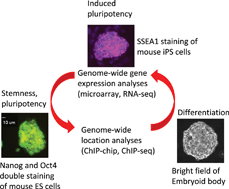Integrative genome-wide approaches in embryonic stem cell research
Abstract
Embryonic stem (ES)

Maintenance work is planned for Wednesday 1st May 2024 from 9:00am to 11:00am (BST).
During this time, the performance of our website may be affected - searches may run slowly and some pages may be temporarily unavailable. If this happens, please try refreshing your web browser or try waiting two to three minutes before trying again.
We apologise for any inconvenience this might cause and thank you for your patience.
* Corresponding authors
a
Laboratory of Cancer Biology and Genetics, National Cancer Institute, Bethesda
E-mail:
huangj3@mail.nih.gov
Embryonic stem (ES)

 Please wait while we load your content...
Something went wrong. Try again?
Please wait while we load your content...
Something went wrong. Try again?
 Fetching data from CrossRef.
Fetching data from CrossRef.
This may take some time to load.
Loading related content
